Philosophy, Law and the Family: A New Introduction to the Philosophy of Law » książka
topmenu
Philosophy, Law and the Family: A New Introduction to the Philosophy of Law
ISBN-13: 9783319845722 / Angielski / Miękka / 2018 / 283 str.
Philosophy, Law and the Family: A New Introduction to the Philosophy of Law
ISBN-13: 9783319845722 / Angielski / Miękka / 2018 / 283 str.
cena 302,60 zł
(netto: 288,19 VAT: 5%)
Najniższa cena z 30 dni: 289,13 zł
(netto: 288,19 VAT: 5%)
Najniższa cena z 30 dni: 289,13 zł
Termin realizacji zamówienia:
ok. 22 dni roboczych
Bez gwarancji dostawy przed świętami
ok. 22 dni roboczych
Bez gwarancji dostawy przed świętami
Darmowa dostawa!
Kategorie:
Kategorie BISAC:
Wydawca:
Springer
Seria wydawnicza:
Język:
Angielski
ISBN-13:
9783319845722
Rok wydania:
2018
Wydanie:
Softcover Repri
Ilość stron:
283
Waga:
0.42 kg
Wymiary:
23.39 x 15.6 x 1.6
Oprawa:
Miękka
Wolumenów:
01
Dodatkowe informacje:
Wydanie ilustrowane











